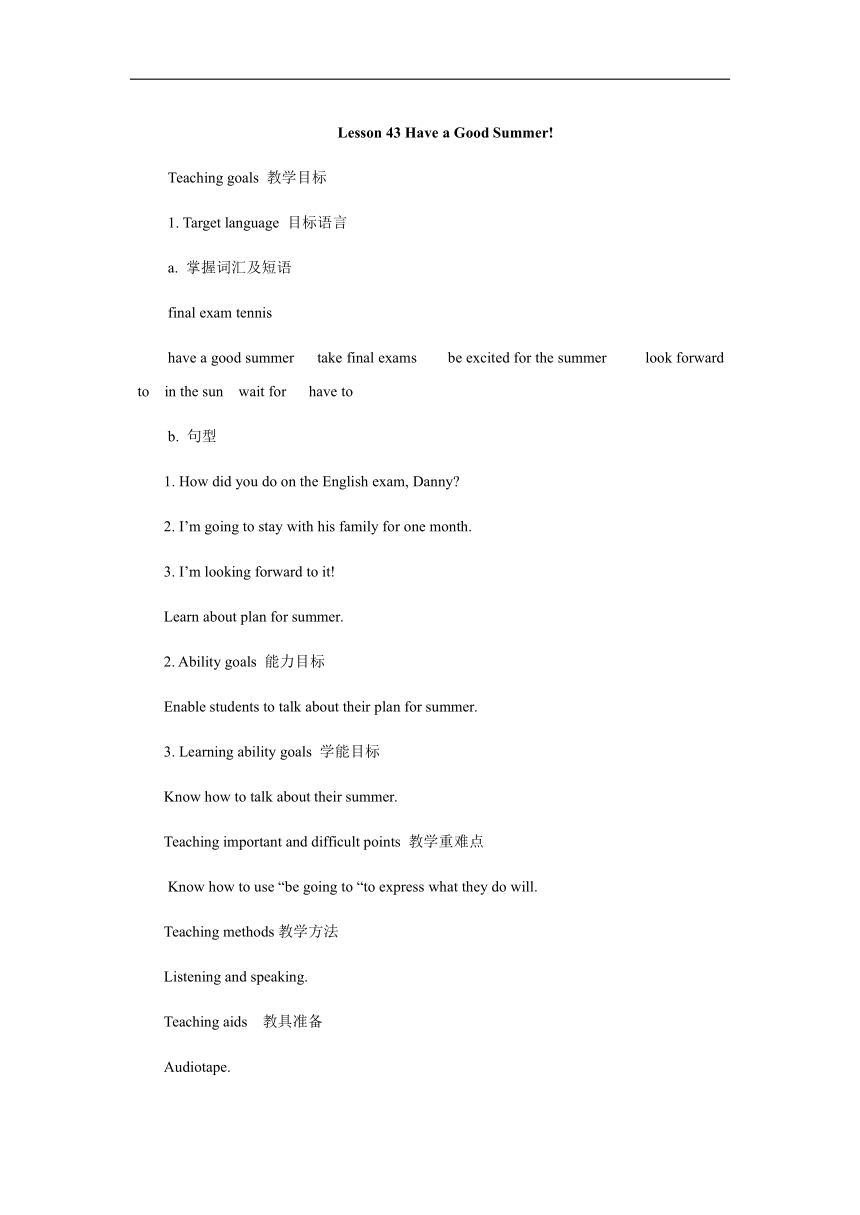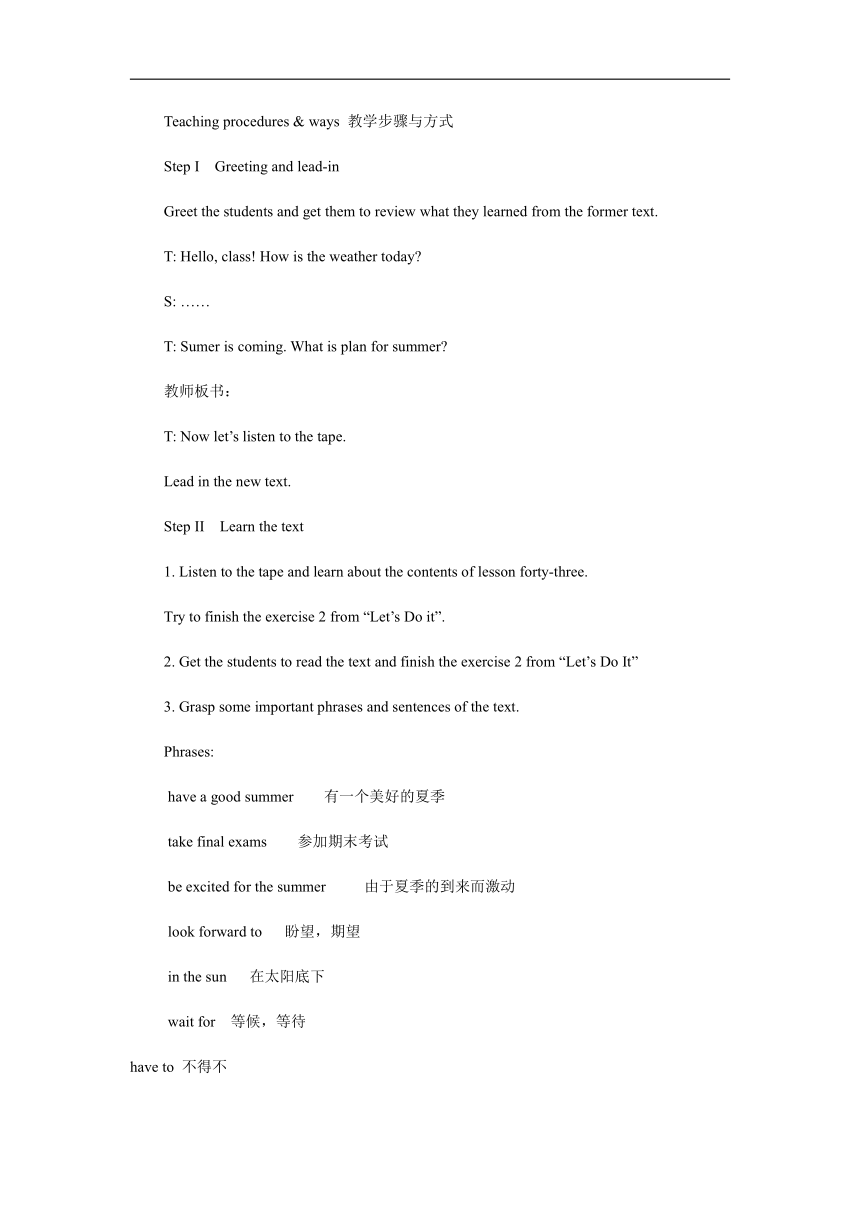Unit 8 Summer Holiday Is Coming! Lesson 43 Have a Good Summer! 教案
文档属性
| 名称 | Unit 8 Summer Holiday Is Coming! Lesson 43 Have a Good Summer! 教案 |

|
|
| 格式 | zip | ||
| 文件大小 | 14.9KB | ||
| 资源类型 | 教案 | ||
| 版本资源 | 冀教版 | ||
| 科目 | 英语 | ||
| 更新时间 | 2019-06-27 00:00:00 | ||
图片预览


文档简介
Lesson 43 Have a Good Summer!
Teaching goals 教学目标
1. Target language 目标语言
a. 掌握词汇及短语
final exam tennis
have a good summer take final exams be excited for the summer look forward to in the sun wait for have to
b. 句型
1. How did you do on the English exam, Danny?
2. I’m going to stay with his family for one month.
3. I’m looking forward to it!
Learn about plan for summer.
2. Ability goals 能力目标
Enable students to talk about their plan for summer.
3. Learning ability goals 学能目标
Know how to talk about their summer.
Teaching important and difficult points 教学重难点
Know how to use “be going to “to express what they do will.
Teaching methods教学方法
Listening and speaking.
Teaching aids 教具准备
Audiotape.
Teaching procedures & ways 教学步骤与方式
Step I Greeting and lead-in
Greet the students and get them to review what they learned from the former text.
T: Hello, class! How is the weather today?
S: ……
T: Sumer is coming. What is plan for summer?
教师板书:
T: Now let’s listen to the tape.
Lead in the new text.
Step II Learn the text
1. Listen to the tape and learn about the contents of lesson forty-three.
Try to finish the exercise 2 from “Let’s Do it”.
2. Get the students to read the text and finish the exercise 2 from “Let’s Do It”
3. Grasp some important phrases and sentences of the text.
Phrases:
have a good summer 有一个美好的夏季
take final exams 参加期末考试
be excited for the summer 由于夏季的到来而激动
look forward to 盼望,期望
in the sun 在太阳底下
wait for 等候,等待
have to 不得不
Sentences:
I’m sure you did well.
我确信你做得好。
be sure 确信。
eg: I’m sure that he will come. 我确信他会来。
I’m sure of my success. 我确信我会成功。
2. I’m going to stay with his family for one month. 我打算在他家待一个月。
be going to 将要,强调按计划、安排去做某事。
will 将要,表示将来要发生的事,可与be going to互换。但表示纯粹的将来时,不能与be going to互换。
I’m going to study art in Beijing.
我打算在北京学美术。
I’ll be 15 next year. 明年我就15岁了。
【谓语动词形式(1)】
“will (shall) + 动词原形”,
用来表示说话时认为或预测将来发生的动作或状态。
will 可用于所有人称,shall 仅用于第一人称 I和 we。
eg: I shall / will be free on Sunday. 星期天我有空。
You and I will work in the same factory. 你和我将在同一家工厂工作。
【谓语动词形式(2) 】
“be going to +动词原形”,
用来表示打算、计划或安排要做的事,或在说话时已有迹象预示会在将来发生的事。
eg: There is going to be a parents meeting tomorrow. 明天要开家长会。
Look! It’s going to rain. 瞧,要下雨了。
【时间状语】
这一时态常用的时间状语有:tomorrow, next+时间, in +时间, 等。
eg: Jack will come back in three days. 杰克三天后回来。
I’ll be more careful from now on. 从现在起我会更加小心的。
Rewrite the sentences using “will” or “be going to”.
She has a new toy car.
→ She is going to have a new toy car tomorrow.
→ She will have a new toy car tomorrow.
2. Jane sings a folk song at the school party.
→__________________________________________
→__________________________________________
3.Sometimes I walk to school.
→__________________________________________
→__________________________________________
4.They listen to the radio every morning.
→__________________________________________
→__________________________________________
Practice
翻译下列句子,每空一词。
1. 期末考试是什么时候? When is the ______ _______?
2. 你喜欢打网球吗?Do you like ______ ________?
3. 我确定明天下雨。 I am ______ it ____________ tomorrow.
按要求转换句子,每空一词。
I am very afraid because I get lost. (对划线部分提问)
________ ________ you so afraid?
2. I think my left arm hurts. (改为否定句)
I ________ ________ my left arm ________.
3. He likes to go on a trip in spring. (对划线部分提问)
________ ________ he ________ to do in spring?
4. I will learn Japanese next month. (改为一般疑问句)
________ ________ learn Japanese next month?
5. Danny can swim in the swimming pool. (改为否定句)
Danny ________ ________ in the swimming pool.
Step III
Work in groups and finish the exercise 4 from “Let’s Do It”.
Homework
Make a plan for your summer holiday and then talk about it.
Teaching goals 教学目标
1. Target language 目标语言
a. 掌握词汇及短语
final exam tennis
have a good summer take final exams be excited for the summer look forward to in the sun wait for have to
b. 句型
1. How did you do on the English exam, Danny?
2. I’m going to stay with his family for one month.
3. I’m looking forward to it!
Learn about plan for summer.
2. Ability goals 能力目标
Enable students to talk about their plan for summer.
3. Learning ability goals 学能目标
Know how to talk about their summer.
Teaching important and difficult points 教学重难点
Know how to use “be going to “to express what they do will.
Teaching methods教学方法
Listening and speaking.
Teaching aids 教具准备
Audiotape.
Teaching procedures & ways 教学步骤与方式
Step I Greeting and lead-in
Greet the students and get them to review what they learned from the former text.
T: Hello, class! How is the weather today?
S: ……
T: Sumer is coming. What is plan for summer?
教师板书:
T: Now let’s listen to the tape.
Lead in the new text.
Step II Learn the text
1. Listen to the tape and learn about the contents of lesson forty-three.
Try to finish the exercise 2 from “Let’s Do it”.
2. Get the students to read the text and finish the exercise 2 from “Let’s Do It”
3. Grasp some important phrases and sentences of the text.
Phrases:
have a good summer 有一个美好的夏季
take final exams 参加期末考试
be excited for the summer 由于夏季的到来而激动
look forward to 盼望,期望
in the sun 在太阳底下
wait for 等候,等待
have to 不得不
Sentences:
I’m sure you did well.
我确信你做得好。
be sure 确信。
eg: I’m sure that he will come. 我确信他会来。
I’m sure of my success. 我确信我会成功。
2. I’m going to stay with his family for one month. 我打算在他家待一个月。
be going to 将要,强调按计划、安排去做某事。
will 将要,表示将来要发生的事,可与be going to互换。但表示纯粹的将来时,不能与be going to互换。
I’m going to study art in Beijing.
我打算在北京学美术。
I’ll be 15 next year. 明年我就15岁了。
【谓语动词形式(1)】
“will (shall) + 动词原形”,
用来表示说话时认为或预测将来发生的动作或状态。
will 可用于所有人称,shall 仅用于第一人称 I和 we。
eg: I shall / will be free on Sunday. 星期天我有空。
You and I will work in the same factory. 你和我将在同一家工厂工作。
【谓语动词形式(2) 】
“be going to +动词原形”,
用来表示打算、计划或安排要做的事,或在说话时已有迹象预示会在将来发生的事。
eg: There is going to be a parents meeting tomorrow. 明天要开家长会。
Look! It’s going to rain. 瞧,要下雨了。
【时间状语】
这一时态常用的时间状语有:tomorrow, next+时间, in +时间, 等。
eg: Jack will come back in three days. 杰克三天后回来。
I’ll be more careful from now on. 从现在起我会更加小心的。
Rewrite the sentences using “will” or “be going to”.
She has a new toy car.
→ She is going to have a new toy car tomorrow.
→ She will have a new toy car tomorrow.
2. Jane sings a folk song at the school party.
→__________________________________________
→__________________________________________
3.Sometimes I walk to school.
→__________________________________________
→__________________________________________
4.They listen to the radio every morning.
→__________________________________________
→__________________________________________
Practice
翻译下列句子,每空一词。
1. 期末考试是什么时候? When is the ______ _______?
2. 你喜欢打网球吗?Do you like ______ ________?
3. 我确定明天下雨。 I am ______ it ____________ tomorrow.
按要求转换句子,每空一词。
I am very afraid because I get lost. (对划线部分提问)
________ ________ you so afraid?
2. I think my left arm hurts. (改为否定句)
I ________ ________ my left arm ________.
3. He likes to go on a trip in spring. (对划线部分提问)
________ ________ he ________ to do in spring?
4. I will learn Japanese next month. (改为一般疑问句)
________ ________ learn Japanese next month?
5. Danny can swim in the swimming pool. (改为否定句)
Danny ________ ________ in the swimming pool.
Step III
Work in groups and finish the exercise 4 from “Let’s Do It”.
Homework
Make a plan for your summer holiday and then talk about it.
同课章节目录
- Unit 1 A Trip to the Silk Road
- Lesson 1 A Trip to China
- Lesson 2 Meet You in Beijing
- Lesson 3 A Visit to Xi'an
- Lesson 4 A Visit to Lanzhou
- Lesson 5 Another Stop along the Silk Road
- Lesson 6 Jenny's Diary
- Unit 2 It's Show Time!
- Lesson 7 What's Your Project about?
- Lesson 8 Marco Polo and the Silk Road
- Lesson 9 Danny's School Project
- Lesson 10 Music and Dance
- Lesson 11 Food in China
- Lesson 12 A Blog about the Silk Road
- Unit 3 School Life
- Lesson 13 How Is School Going?
- Lesson 14 Jenny's School Life
- Lesson 15 Making a Difference
- Lesson 16 We Are with You!
- Lesson 17 School Science Fai
- Lesson 18 Teaching in China
- Unit 4 After-School Activities
- Lesson 19 A Dinner Date
- Lesson 20 Join Our Club!
- Lesson 21 What Is Your Club Type?
- Lesson 22 Big Plans for the Weekend
- Lesson 23 A Weekend with Grandma
- Lesson 24 How was Your Weekend?
- Unit 5 I Love Learning English!
- Lesson 25 A Phone Friend
- Lesson 26 Online Phone Calls
- Lesson 27 Amazing English
- Lesson 28 How Do I Learn English?
- Lesson 29 A Door to the World
- Lesson 30 Writing an E-mail in English
- Unit 6 Seasons
- Lesson 31 What Strange Weather!
- Lesson 32 I Can't Wait for Winter!
- Lesson 33 Kim's Favourite Season
- Lesson 34 Steven's Report
- Lesson 35 Surfing in Sydney
- Lesson 36 Spring in China
- Unit 7 Sports and Good Health
- Lesson 37 You Are What You Eat!
- Lesson 38 Stay Healthy!
- Lesson 39 Danny's Report
- Lesson 40 Move Your Body
- Lesson 41 Were People Healthy Then?
- Lesson 42 Know Yourself
- Unit 8 Summer Holiday Is Coming!
- Lesson 43 Have a Good Summer!
- Lesson 44 Volunteering in Summe
- Lesson 45 Baseball Season
- Lesson 46 Get Ready for Summer Holiday!
- Lesson 47 Summer Plans
- Lesson 48 Li Ming's Summer Holiday
